
Social media for real estate agents is now an essential part of the marketing strategy.
The 21st century has brought a lot of surprises with it — not least of all self-driving cars and monkeys playing pong with their minds (thanks, Musk) — including how real estate agents find clients and grow their businesses.
A few decades ago, business cards and direct mail were all the rage. That was just about all an agent could do to find clients.
The internet has changed that.
Social media, in particular, has created a massive opportunity for real estate agents to build trust, display their expertise, and find clients… all without leaving the comfort of their sofa.
How?
That’s what we’re talking about here — why you should use social media, which platforms are best, what to post, how often to post, and how to optimize your profiles to attract clients.
First things first!
Why Should Real Estate Agents Use Social Media?
So you’re looking for a way to find clients consistently.
Maybe you’ve seen other real estate agents use social media successfully… or maybe you just got the idea without any prompting.
Whatever the case — however you came about the idea of using social media posts for real estate to find clients — it’s a good idea.
And you don’t have to take our word for it.
SocialMediaToday published stats revealing how impactful social media has been for real estate agents. In 2020, 44% of agents said they found clients through social media…
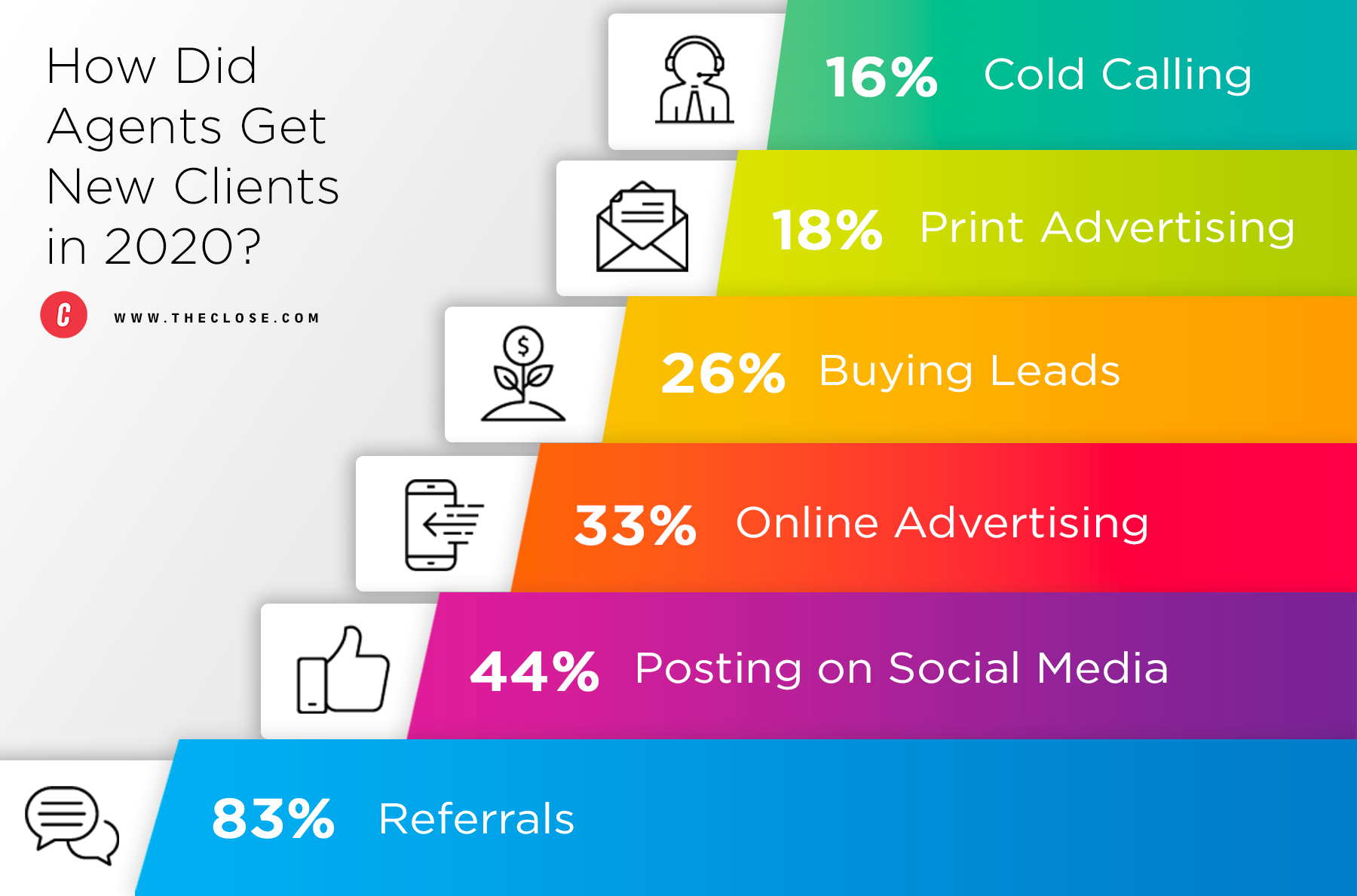
Additionally, 82% of real estate agents said they would focus on improving their social media presence to grow their business…
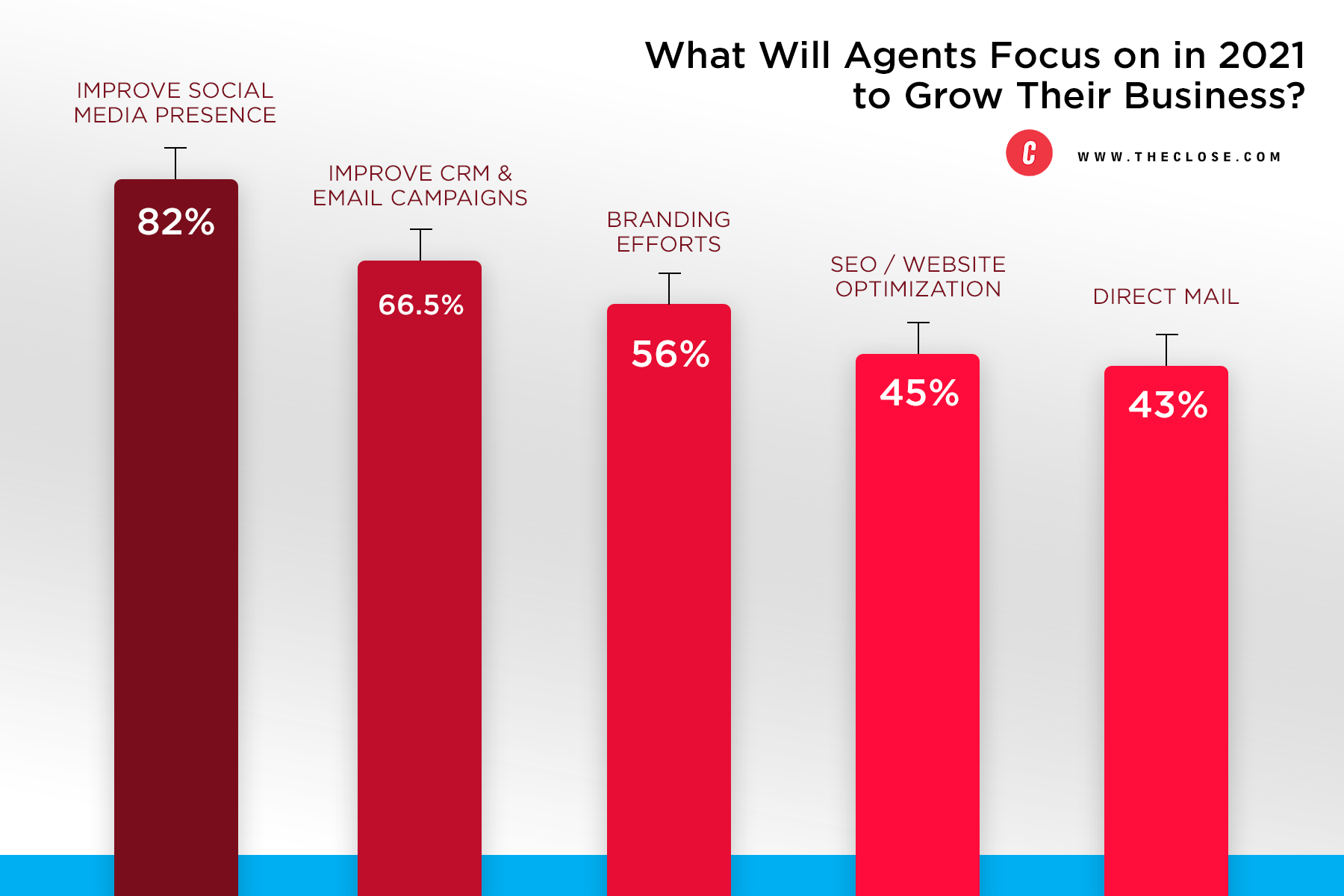
So there should be no doubt.
Done right, social media marketing (both organic and paid) can be an extremely effective strategy for growing your real estate business.
You can increase brand awareness, showcase your expertise and years of experience, build authentic relationships, and, most importantly, find clients.
Now, let’s talk about which platform you should use.
Which Social Media Platform is Best For Real Estate Agents?
The bad news is that there are hundreds of social media platforms.
The good news is that the vast majority — for our purposes, all but four — are obsolete.
Most of them have too few users to be worth your time. And we can even eliminate many of the platforms that do have millions of users because they’re not very localized — Twitter, Pinterest, LinkedIn, etc.
Every platform has a vibe.
And what we’re really looking for is social media platforms where people expect to connect with other people in the same city. Because, as a real estate agent, local relationships will be the most valuable relationships.
So, we’ve narrowed it down to three platforms: Facebook, Instagram, and TikTok.
1. Facebook
Facebook is an excellent platform for real estate agents because people expect to connect with people in their city — with “friends.” So both close friends and acquaintances won’t hesitate to accept your friend request.
Here are some interesting stats about Facebook.
- Facebook usage is high among U.S. adults, earning over $70k annually.
- 70% of U.S. adults use the Facebook platform every day.
- 69% of Americans use Facebook.
Examples
Here are some examples of Facebook posts from other real estate agents!
Listing post…
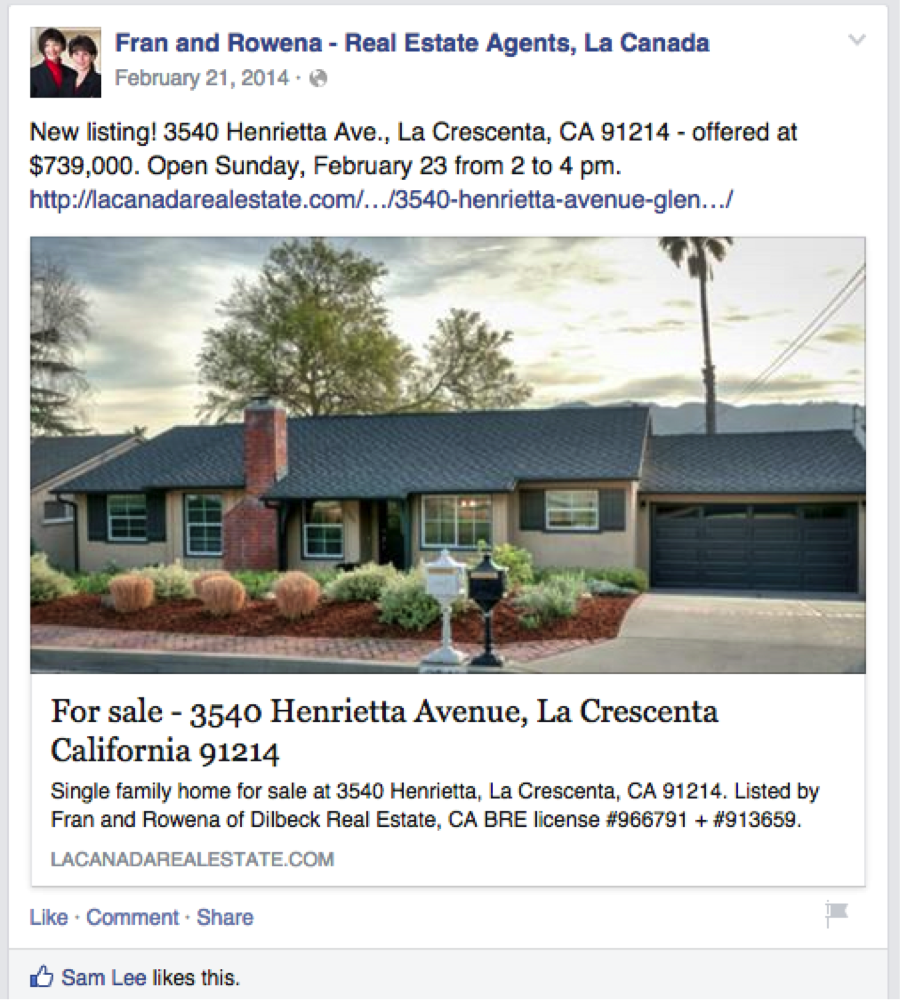
Case study post…

Behind-the-scenes post…
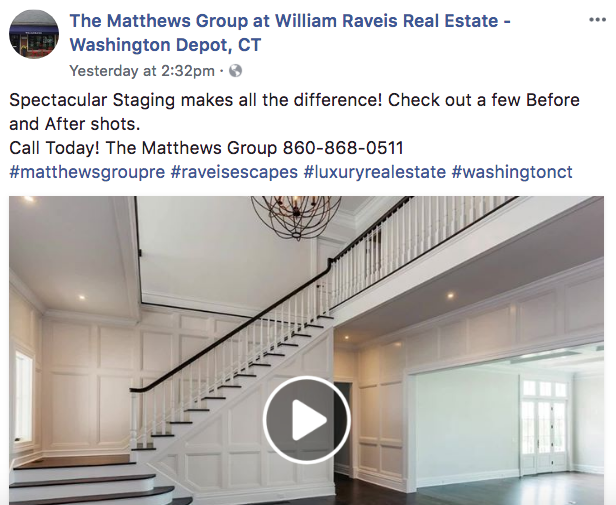
How Often To Post
The experts at Hootsuite recommend posting 1-2 times daily on Facebook. This should help you stay present in the minds of your audience but not overwhelm them.
Other Facebook Tips
Here are some other tips when you’re posting on Facebook…
- Be Authentic — Facebook users love authenticity. They want to get to know the real you… not necessarily the business. So don’t be afraid to discuss yourself or share your thoughts and opinions!
- Don’t Oversell — On Facebook, you shouldn’t try to sell people with every post. You should also entertain people, give them free value, and offer free advice. Make sure you balance your listing posts with other, more personal, value-driven posts.
- Stay Top-Of-Mind — The goal of Facebook is to stay top-of-mind and to build trust. It’s more about consistency, value sharing, and brand awareness and less about mindlessly posting all of your listings.
2. Instagram
Instagram is similar to Facebook in that people are open to following people they know locally. If it’s better than Facebook, that would be because it’s a highly visual platform. And obviously, real estate is highly visual.
Beautiful house listings and before-and-after pictures do really well on Instagram. Let’s look at some examples…
Examples
Here are some great Instagram post examples from Krista and Aaron Farr from Spokane. So that’s where these examples come from.
Testimonial post…
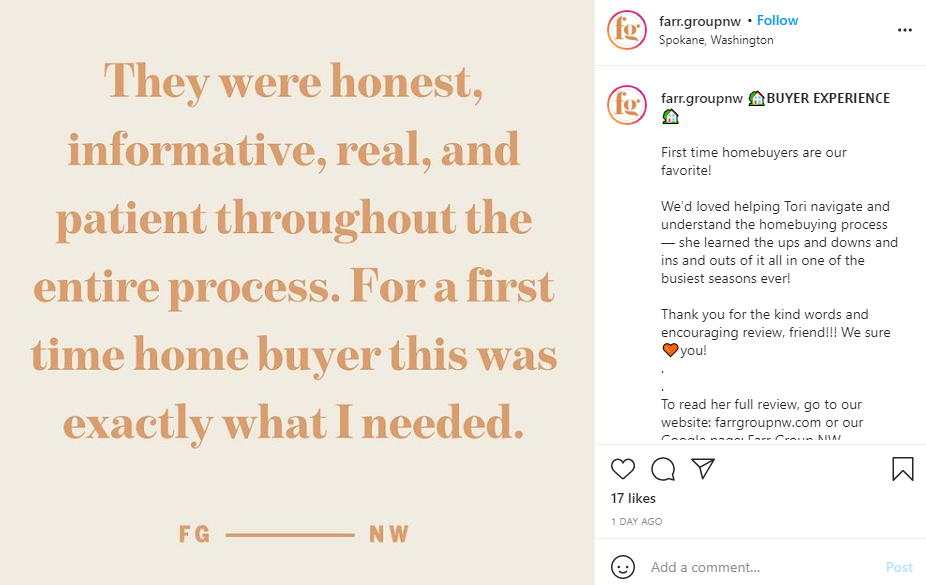
“Sold” notifications…
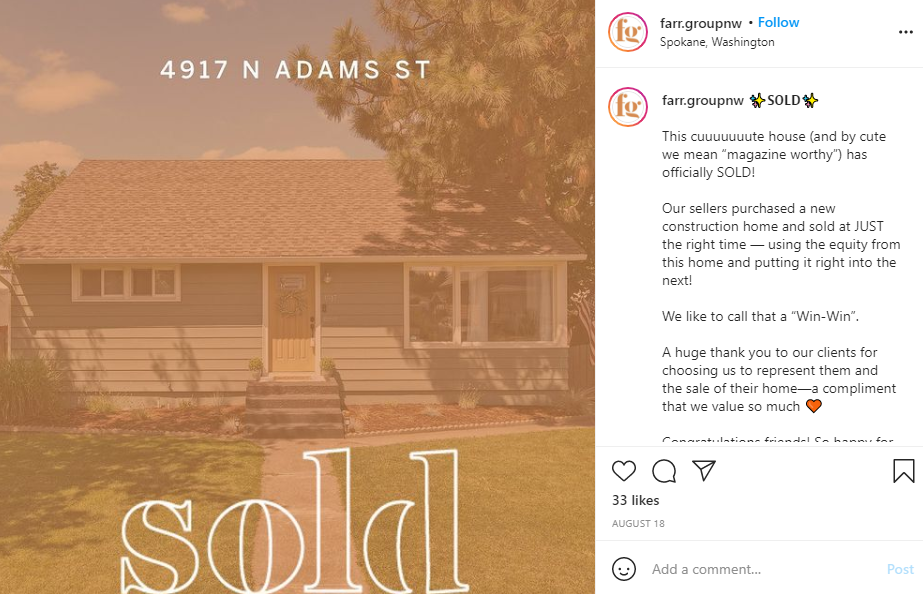
Storytelling post…
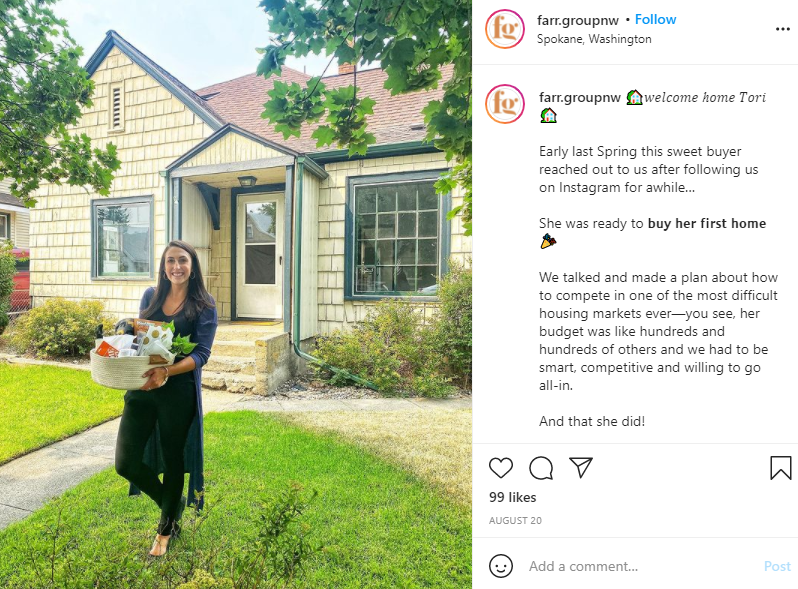
How Often To Post
Hootsuite recommends posting 3-5 times per week on Instagram.
Other Instagram Tips
- Focus On Visuals — Instagram is a highly visual platform. So, focus on making the visuals eye-catching and beautiful. This should be easy if you already get professional photos for your listings!
- Use Hashtags — On every Instagram post, use as many hashtags as you can. That will increase the post’s visibility. Here’s a screenshot of all the Hashtags the Farr Group uses on one of their Instagram posts…
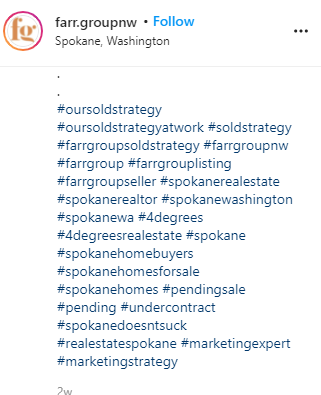
- Create a Vibe — Your Instagram profile should have a “vibe” across all the posts. That is, they should use similar colors and have a similar “feel.” Check out the screenshot below to see what I mean…

3. TikTok for Real Estate
TikTok is a relatively new social media platform with tons of potential for real estate agents. Like Instagram, it’s very visual. But instead of every post being an image or graphic, every post is a short, user-made video.
The best TikTok videos are value-driven, authentic, funny, and entertaining. The best part is that TikTok localizes the content that people see — so if you live in Roseburg, Oregon, you’ll see content from people in Roseburg, Oregon.
It also means that people in your city will see your content more than people outside your city — that’s good for business!
Examples
Here are some examples of content from real estate agents on TikTok.
Why buy instead of rent…
Market update…
How Often To Post
You should post at least once per day on TikTok.
Other TikTok Tips
- Be Entertaining — Posts that perform well on TikTok are fast-paced and entertaining. So try to mimic what you see doing well. Be funny, provide tons of value, show interesting behind-the-scenes anecdotes, or tell a crazy story to keep people engaged.
- Hop on Trends — TikTok is jam-packed with different trends. People doing the same dance, mimicking the same movie lines, or something else. While these trends are a little silly, they’re a great way to get more eyes on your content.
- Post Often — On TikTok, you should post at least once daily. But more often is pretty much always better.
Optimizing Your Social Media Profiles To Attract Clients
Remember why you — a real estate agent — want to start using social media.
It’s not to gain fame, to scroll your way into oblivion, or to connect with tons of random people…
It’s to grow your business.
One thing we’ve got to think about when it comes to growing your business through social media is what people will see when they visit your profile.
After all, that’s the goal — that people will see your content, get curious, click on your profile, learn about you, and maybe, at some point, become a client.
But people can’t just be impressed by your content; they must also be impressed by your profile! Or at least not unimpressed.
There’s a baseline that you need to hit — so let’s look at great profiles on Facebook, Instagram, and TikTok and then muse about what makes those profiles great.
Here’s the Farr Group profile on Instagram…

Here’s Shannon McCaffrey’s Facebook profile…
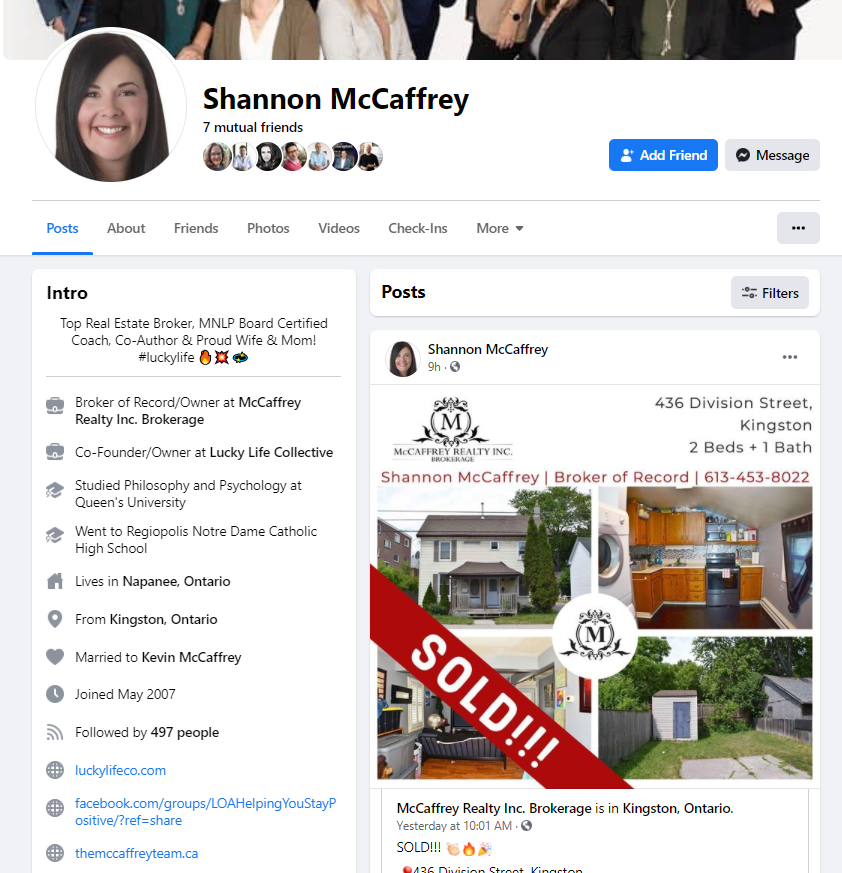
And here’s Zamira Lalji’s TikTok profile…

Okay — so what do these profiles have in common?
First, they don’t have to include custom logos and super amazing graphics… they can be pretty basic. The things that these profiles all have — and that YOU should include! — is…
- Bio — Who are you? All of the above profiles answer that question quickly and clearly. Tell people that you’re a real estate agent, and tell them where you operate!
- Credibility — The above profiles also build credibility. Are you a top 1% real estate agent? Have you won awards? How many people have you helped sell their homes? Try to build some credibility by using those stats in your bio!
- Links — Finally, these profiles tell people where to go (via links) if they want to learn more. So don’t forget to include a link to your website.
P.S. Don’t Forget Your Website!
Let’s imagine someone clicks through to your profile because they are currently looking for a real estate agent — crazier things have happened!
They are impressed by your profile and recent social media posts, so they click through to your website (via the link on your profile). Then what happens?
Well, that entirely depends on how effective your website is at converting visitors into leads.
Fortunately, conversion is a science — a science that we’ve mastered at Carrot. We specialize in building high-converting websites for real estate agents and investors. Click here to learn more and to try us out for yourself risk-free!
Paid vs. Organic
So far in this guide, we’ve talked almost entirely about organic social media marketing — posting content, building connections, and garnering a following.
But it’d be a disservice to not briefly mention social media advertising, which can also be an effective (and more direct) way to generate real estate leads.
So here’s a quick overview with links to learn more…
The Paid Strategy
Facebook and Instagram are probably the best places to advertise your services as a real estate agent — and since you’re paying to reach people, these posts can be much more direct.
Here’s an example.
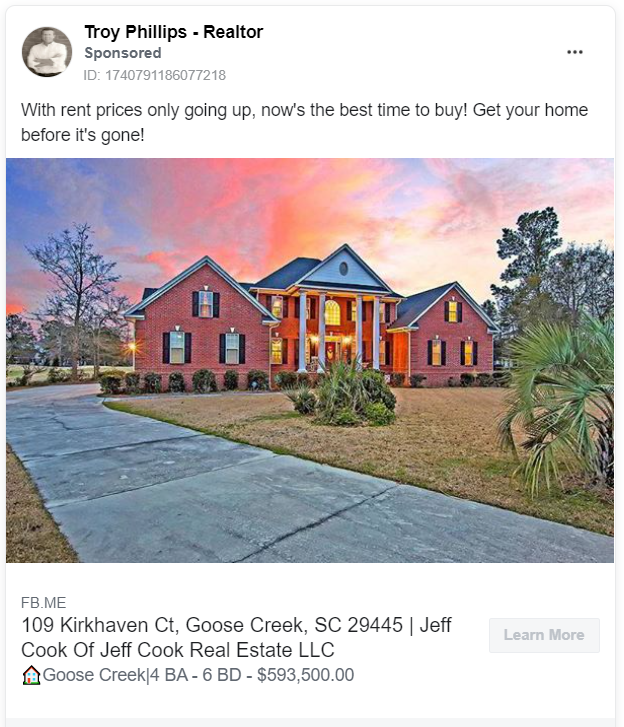
And what’s really cool is that Facebook allows you to target people by zip code… so you’ll only reach people within your target market!
Another helpful strategy is called “retargeting” — the Facebook Pixel allows you to track website visitors and then run advertisements to people who visited your website but who didn’t provide you with their contact information.
Cool, right?
Of course, ads cost money.
You’ll want to track results to see if your spending gives you the needed ROI.
To learn more about Facebook advertising, check out our interview with Josh Schoenly, where he shares his proven Facebook advertising framework!
The Organic Strategy
Organic social media marketing is what we’ve been talking about throughout most of this article.
This means seeking out authentic connections, posting organic (non-paid) content, and perhaps most of all… being consistent. Getting followers, building trust, and becoming the go-to expert in your market via social media isn’t an overnight venture… it’s something that will take a lot of time and persistence.
The more that people see your content and the more they like your content, the better.
The best thing you can do is create a content publishing schedule and stick to it for at least the next 6 months — see what happens!
52 Real Estate Content Ideas For ANY Social Media Platform
Okay — now the rubber meets the road.
You know you want to start using social media to grow your business. And you even know what platform you’re going to use and how often you’re going to post…
But what are you going to post ABOUT?
Normally, that’s the hardest part of social media marketing — knowing what to talk about.
But we’ve made this super easy for you.
We created this playbook with 52 marketing ideas for real estate agents— and you can easily turn each of these ideas into a social media post instead of a blog post. So click that link and bookmark the guide for when you’ve run out of ideas.
As always, we’ve got you covered. ;-)
Final Thoughts
Social media is a powerful tool with tons of potential for real estate agents.
And now you know where to start!
Choose a platform — Facebook, Instagram, or TikTok — create a publishing calendar, stick to it, and bookmark this page to get inspiration and examples when you can’t think of something to share.
Over time, you’ll increase your brand awareness, build trust, and find new clients. Don’t be tempted to automate this, the risks aren’t worth the reward!
You’ll also have a competitive advantage over other real estate agents in your market — real estate agents who aren’t using social media.
So it’s well worth your time.
All that’s left now is action and consistency — off you go!